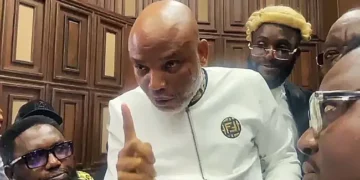In a recent commentary, I reflected on the presence of popular crossdresser and transgender figure Bobrisky, whose real name is Idris Okuneye, in the public sphere. Her antics often reveal deeper societal issues, and this was particularly evident when she became a focal point at the National Assembly. The spectacle of lawmakers inviting a social media personality, alongside a self-proclaimed “native doctor,” to discuss a matter of public interest underscores the superficiality that permeates our legislative bodies.
The National Assembly’s decision to summon Bobrisky was ostensibly part of an inquiry into a leaked recorded conversation that had sparked public interest. However, the character of the individual who released the tape raises questions about the credibility and intent behind the inquiry. This person did not engage in any investigative work; instead, he merely shared a private conversation that he had been given to blackmail Bobrisky over an alleged debt. The motivations behind such a summons bring into question the seriousness of our lawmakers, whose antics often appear more akin to a circus than a governing body.
The absurdity of the situation escalated when Bobrisky, displaying a rare moment of discretion, chose not to appear before the assembly. The question looms: what were the legislators hoping to achieve by juxtaposing two individuals whose motives seem rooted in personal gain rather than genuine public service? The National Assembly’s actions reflect a troubling trend where serious matters are trivialized into mere entertainment for the public.
While it is understandable that lawmakers may wish to address the public interest surrounding the leaked tape, their approach lacks seriousness. If they are genuinely interested in reforming the criminal justice system, they need look no further than the extensive research available in libraries, including those at the National Institute for Policy and Strategic Studies (NIPSS) in Kuru, Jos. Instead of pursuing frivolous inquiries into the lives of social media influencers, they should focus on the real issues affecting the system.
The concern over the Nigerian prison system is not new. Investigative journalist Fisayo Soyombo previously published a harrowing account of the systemic failures within the prison system, even going so far as to experience incarceration himself to highlight the corruption and neglect that permeate it. If the National Assembly were earnest in their quest for reform, they would summon individuals like Soyombo, whose insights are grounded in lived experience and empirical research, rather than chasing after social media spectacles.
It is critical to clarify that I do not oppose investigations into the allegations surrounding Bobrisky or the actions of the Economic and Financial Crimes Commission (EFCC). The allegations of bribery, particularly the reported N15 million bribe, warrant serious examination. The EFCC’s justification for dropping money laundering charges against Bobrisky, which involved her own statements about her unregistered business, raises alarming questions about the agency’s practices and intentions.
The EFCC appears to operate in a manner that prioritizes sensationalism over substantiated claims. Their initial arrest of Bobrisky lacked a solid foundation; it seems they hoped to extract a confession or evidence through coercive means. This pattern of behavior suggests a concerning opportunism within the agency, as they seem to view high-profile individuals as mere opportunities for media attention rather than focusing on genuine criminality.
The EFCC’s investigation tactics, particularly regarding the handling of Bobrisky’s case, reflect a broader issue within the agency. The manner in which they pursued charges against her, seemingly based on her own admissions after coercive detention, indicates a troubling trend where the agency does not conduct thorough investigations before making arrests. This ineptitude raises serious doubts about the integrity of their operations and their ability to carry out their mandate effectively.
Moreover, the broader implications of this inquiry highlight the need for a more serious evaluation of the relationship between social media phenomena and legislative processes. The National Assembly’s fixation on personalities like Bobrisky distracts from the pressing issues of institutional collapse and systemic corruption that require urgent attention. The focus should shift from sensationalist inquiries to substantive investigations that address the root causes of societal decay.
In conclusion, the National Assembly’s handling of the Bobrisky inquiry serves as a disheartening commentary on the state of governance in Nigeria. Rather than engaging in meaningful dialogue about reform, they have reduced serious matters to the level of entertainment, undermining their own authority and relevance. As citizens, we must demand better from our elected officials and hold them accountable for their actions, ensuring that they prioritize the welfare of the public over the fleeting allure of social media spectacle.









